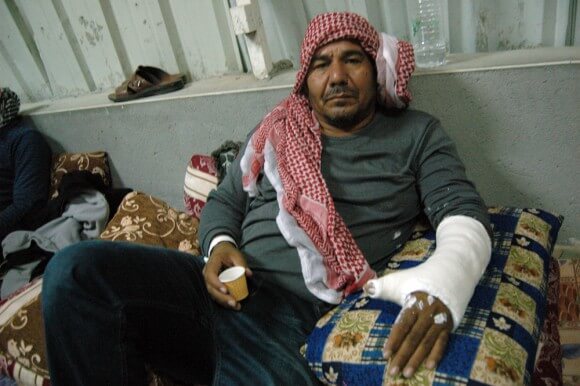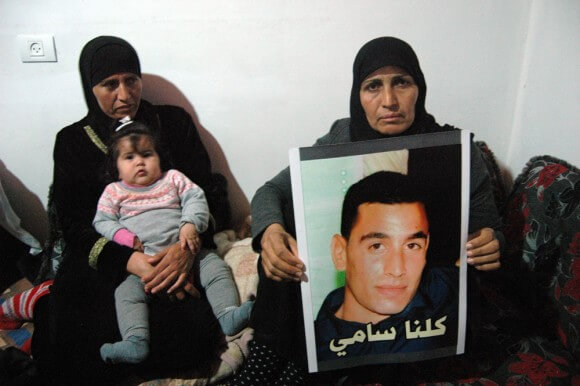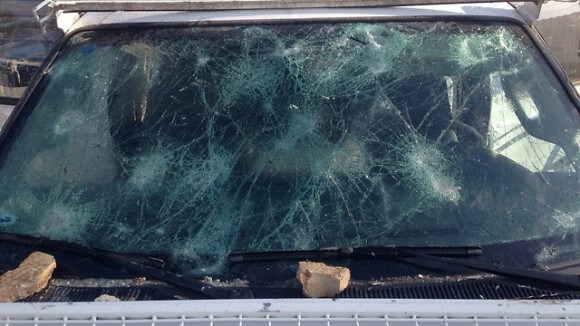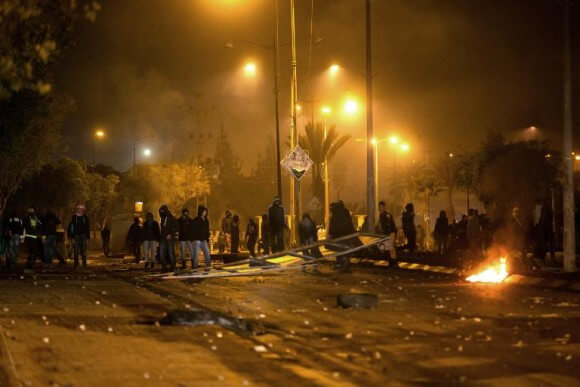Rahat, a Bedouin-Arab town and one of the most underserved municipalities in Israel, is now an unlikely forerunner of unrest between the state and its Arab-Palestinian citizens. The upheaval began two weeks ago when police killed Rahat resident Sami Ja’ar, 20, in his front yard during a sting operation gone wrong. Days later 20,000 attended the burial ceremony. They bussed in from across the country. However, within minutes of laying Ja’ar underground, the funeral turned into a mammoth clash with the authorities, and a second man died from a heart attack following tear gas inhalation. The town’s mayor was also shot in the face with a tear gas canister and trampled upon. Another city employee, a teacher, lost an eye after a dispersant was fired at him by police. It was the largest confrontation in the town in 20 years.
Mayhem had seemingly swallowed Rahat. For the next week the city boiled in protests and a general strike. Scores were injured and dozens arrested. It was then that the wounded mayor said his municipality will no longer cooperate with the Israeli authorities, further dividing Bedouins who already have a mixed relationship with the state where some serve in Israel’s military, and others protest it (Bedouins, are not included in Israel’s draft and service is voluntary).
At one time Rahat was a beacon of hope for the 20-percent Arab minority’s integration into the state. Established in the 1970s, it was the first locality designed specifically for Bedouins, 180,000 Arab-Palestinians of semi-nomadic origin but sedentarized for the past 200 years. The Israeli government has acknowledged Bedouins are indigenous people, and Rahat was supposed to be the state’s answer to how this population would live with the same lifestyle Jewish-Israelis enjoy. Moreover around half of the Bedouin population lives on land tracts without building permits exposing them to home demolition, but in Rahat that state sanctioned new construction. It was promised to become a modern urban city, and not a reservation. Rahat’s first factories were built under the Rabin government and the town experienced a population boom. Economic prosperity seemed viable for what Israel called its “planned township” pilot project. Bedouins like Khalid, Sami Ja’ar’s father, joined the Israeli police force.
Decades later Rahat does not resemble the city they have been waiting for. There are dirt roads in the town’s center, and the entrance is buttressed with open sewage and a junkyard. To its residents, Rahat is a ghetto with one of the highest poverty and crime rates in Israel. It is regarded as a place to live only after being evicted from historic grazing lands, and encampments. Still Rahat had always retained much better relations than other Bedouin towns with the Israeli government, despite neglect and a lack of investment.
However, following the deaths the relationship with Israel has unravelled. The play-by-play of Sami’s killing and what Bedouins believe to be an attack on his funeral are being absorbed as a message that even if Bedouins accept all of Israel’s rules about abandoning their traditional ways, they will never be treated as equals in the Jewish state. The clashes in Rahat over the past few weeks show Bedouins are losing patience working with Israel.

The first death
The turmoil began on January 14, 2015, the night Sami Ja’ar was killed. Sami had just returned from work at a factory. From inside of his house he heard sounds of an altercation on the street. He exited the front door, followed minutes later by his father, Khalid Ja’ar, 44, a former border police officer. For the past six years Khalid has also worked for hire for Birthright Israel, giving presentations to young Jews on ten-day tours. As part of the program the college-aged travelers stop off in the southern Negev desert for a “Bedouin experience.” Khalid was their guide through “camels and tents,” he says, and while they spent the night in a tent and feasted on traditional Arab dishes, Khalid “explained about my tradition.”
Birthright’s PR firm Galai confirmed Khalid’s employment in a statement to Mondoweiss and the Jewish Journal of Los Angeles. “We are very sorry for his loss and we extend our most sincere condolences to his family,” an official for the group said, adding that “thousands of people work for Taglit-Birthright Israel” and “we do not know the circumstances of his death well enough for us to deliver another statement.”
Khalid spoke tearfully from a mourners’ tent in his front yard, meters from where Sami was shot. He recalled each detail, “I was in bed. I heard Sami screaming from the schoolyard. I put on my pants and I went barefoot.” Outside, Khalid saw his Sami laying face down in the street with police on top of him. Two other men were in the same position, detained during the drug bust. There were warrants to arrest them, but not Sami. He had wandered from his front yard into a planned operation that was underway and had somehow gotten engulfed in the mess. Khalid then had his own encounter with a police officer, “and so I pushed him and he fell to the ground.” After which, that the same uniformed cop cocked his gun, and threatened Khalid. Scared, he returned to his home with his son still in the street.
Other members of the family said they saw youths throwing stones at the police. Moments after returning to his house Khalid peeked out to see Sami walking aimlessly, now back in the front yard, no longer detained. Khalid could smell pepper spray. His son appeared to be moving in a dazed fashion. Then Khalid, “heard two single shots.” His son approached, bleeding from the abdomen and said, “Dad, they shot me.”
“I told him it’s a flesh wound to try and calm him down,” cried Khalid. Within minutes he loaded Sami into a neighbor’s car and sped off to Rahat’s medical center.
There are no hospitals in Rahat.
“The last time I saw him I put him in the bed in the clinic, breathing, but he wasn’t conscious,” Khalid continued. He was then apprehended by police at the medical center for assaulting an officer and was transferred to Rahat’s police station. Inside of an interrogation room, cuffed and shackled, Khalid was beaten. He faded in and out of mental clarity from a fresh blow to the back of his head by the handle of a gun. He could not recall how long he was in the room, but at some point his hearing focused on a loud knocking and a voice. “This man, he was a Jew. He was standing outside of the door banging to come in,” Khalid said, crediting the end of his torment to an Israeli medic who demanded to enter.
Three days later, the mayor of Rahat posted a bond for 50,000 NIS for Khalid’s release. Only then did the father learn that his son had died.
“I have nothing to say. My heart is somber and bleeding,” said Khalid. ‘Sami,” he continued, “was a normal guy. His employers liked him, I love him dearly, he was like a friend to me not a son. We laughed together.”
“I sometimes think of taking my life, but then I think of my children. It’s a hard plight,” Khalid added.
The Israeli police confirmed to me that officers killed Sami during an “action against a drug trafficking stop,” but that Sami was not wanted for narcotics. They said three officers were hospitalized for injuries during a clash with youths that broke out while conducting arrests. Police were not able to confirm Khalid’s account of the beatings. However, Khalid was released from police custody with a broken hand that was later casted at an Israeli medical facility. Nava Tabo, a spokesperson for the Southern Regional Commander added, “The circumstances and source of the shooting are under investigation in internal investigations office. His father beat the police officers and continued his severe violence towards them at the police station. His arrest was extended by the court until last Monday, however he was released early by the police in order to allow him to attend his son’s funeral on Saturday.”
Khalid hoped for a calm burial the following day. But protests against his son’s shooting had spread across Arab-Palestinian cities in Israel. The spotlight was on Rahat, even though Khalid and the mayor are from a generation in which Bedouins sought to work with the state and to salvage the tone of coexistence, even if that coexistence is not always peaceful. Even city hall is plastered with this history. Pictures of Rahat’s officials with Shimon Peres and the late Yitzhak Rabin and Yasser Arafat line the walls like a mausoleum to the Oslo-era. Encapsulated in each snapshot is the promise of the époque of the peace accords to deliver not only a Palestinian state for the occupied territory, but equality inside of Israel for Bedouins.
Working with Rahat’s mayor, Khalid reached an agreement with the Israeli police. Officers would block off the highway leading to Rahat’s cemetery and no police would enter the mourner’s area. In return, the municipality promised the procession would not be political in nature and no violence would take place.

Hiding from gunfire behind gravestones
On Sunday Sami was interred during a sunset ceremony in a plot near the front gates of Rahat’s cemetery. Two versions of a martyr’s placard were mounted to the entrances, one in Hebrew and one in Arabic, with the tag line: “we are all Sami.”
Yet minutes after fresh dirt covered Sami’s remains, headlights appeared on the dark highway that was supposed to be closed, per the police guarantee. Rahat’s mayor Talal al-Krenawi said the crowd of 20,000 grew angry, but he yelled through a megaphone that the masses should not engage the vehicle.
The bright lights that shined in the desert night were from a vehicle in the Yoav unit, a special riot police force formed in 2012 in advance of a government plan to demolish thousands of Bedouin homes in unrecognized villages. The unit does not conduct general policing. It was trained in anti-terror tactics by a Baltimore-based firm Masada Tactical, which prepares police forces for military style operations and even provides private security for celebrities like Kim Kardashian. However, Rahat is not an unrecognized village. Its buildings are legal under Israeli law. As such, the Yoav unit is not known to operate there.
Witnesses say police fired live rounds into the air from the vehicle’s open window. “They just came charging by car in the middle of people, charging inside the funeral itself. Pushing cars and people around,” said Fadi Msamra, 37, the general director of the Regional Council of Unrecognized Villages.
Most of the mourners sought cover in the cemetery but others hurled stones at the vehicle.
The Yoav unit’s truck then attempted to drive back out the way it entered, lumbering into parked cars and darting pedestrians. “They tried to drive over people, I’ve seen it myself,” added Fadi.
Within ten minutes, 15 back-up units arrived, this time from the local police force, according to police spokesperson Micky Rosenfeld. The night sky lit up in a caldron of tear gas, rubber bullets, sponge grenades and concussion grenades, which were sprayed into the crowds and the hillside covered in headstones. Israeli photojournalist Oren Ziv, 29, who was taking pictures of the funeral, said that at first sight of the convoy, “the masses ran away, thousands ran.” While hundreds who were not involved in the clash “were caught in tear gas.” Ziv added that he saw “people [who] were hiding between the graves. Literally, hiding on the ground.”
It was at this time that Rahat’s mayor was struck with a gas canister. The leader who had tried to keep another clash from taking place fell to the earth, and his constituents ran over him trying to get away. The mayor was among dozens knocked to the ground, their bodies littering graves.
Witnesses said 30 minutes elapsed between the police convoy’s arrival and the first emergency medical responders. Later that same evening Sami Zayandeh, 47, who had suffered gas inhalation and then a cardiac event, was pronounced dead.
Police spokesperson Micky Rosenfeld said 22 sought medical treatment for injuries, but the mayor of Rahat places the number much higher. He said 327 were injured, including those who suffered from tear gas inhalation.
CCTV footage released by the police from a helicopter flying overhead shows the Yoav truck rammed into sedans, and mourners threw stones at their vehicles. The Southern Regional Commander police spokesperson also confirmed that there was an agreement with the city of Rahat not to enter the funeral area. “A police vehicle that wasn’t connected at all to the police’s deployment for the funeral and was on its way home, got entangled.” But the spokesperson denied that the Yoav unit’s truck “broke into a checkpoint,” despite noting that there was indeed a police barrier re-directing vehicle traffic.

“The police officers were caught in the middle of a lynch,” the police spokesperson said. “Thanks to the fact that these are trained combatants, who know how to deal with extreme cases, a tragedy of a heavy killing of people was avoided. This is due to the fact that, despite the real danger to their lives, the attacked police officers didn’t fire towards the rioters, as evidenced by the fact that no one was injured with live ammunition at the funeral.”
An official inquiry is underway to examine why the police truck entered the funeral. The spokesperson said that the violation of the earlier agreement did not justify the stone-throwing response. Police arrested fifteen mourners. They are still in custody and have not yet been charged. “We have in our possession lists of all involved in the clinching of the police officers and we’ll arrest them at the time and timing we choose,” added the police spokesperson.
The day after Sami’s burial, Israel’s president Reuven Rivlin called the Ja’ar family and offered condolences. “We all have an obligation to care for the injured and those hurt, especially for those in the Bedouin community and it’s very important that we do that together,” he said.
Yet harsher words were offered by members of Israel’s ruling coalition. Likud’s Miri Regev said, “The time has come for the rioters to understand that they are not above the law, and that the officers are no sect’s punching bag.” Israel’s Minister of Public Security Yitzhak Aharonovich said, “the police were attacked” by groups inspired by “the Islamic Movement” and “Arab Knesset Members, who incite and agitate, in order to deliberately harm the delicate fabric of life, and to stain an entire populace, most of which is law abiding.”
Tali Shapiro contributed reporting to this article.



There is no safety nor respect for any indigenous Palestinian/Bedouin trying to exist with this monstrous Occupation force and government.
None.
(btw~ this ‘Masada Tactical’ sounds perfectly awful~ more contractors, more war, more death)
Wow, this article was just jam packed with interesting tidbits.
“There are no hospitals in Rahat.”
Wikipedia says the population is over 40,000. Hope one of our local hasbarists can explain that one.
“Baltimore-based firm Masada Tactical, which prepares police forces for military style operations …”
How about we use the military for military ops.
“an official for the group (Taglit) said…we do not know the circumstances of his death well enough for us to deliver another statement.”
Translation: we do know the circumstances of his death but it’s too embarrassing to comment upon.
“The police officers were caught in the middle of a lynch,” (?!) the police spokesperson said. “Thanks to the fact that these are trained combatants, who know how to deal with extreme cases, a tragedy of a heavy killing of people was avoided.”
Just some “light” killing, nothing to get too worked up about.
“The Israeli government has acknowledged Bedouins are indigenous people”
Mighty white of them.
Frankly, if I wanted tactical advice, people who name their company after a failed siege which ended in a mass-murder-suicide would be the last people I’d want to listen to. What’s next? Waco Strategic Planning? Salvan & Chérennes Prospective Calculus?
what an incredible article allison. i had heard lots of horrible pieces of this story before but all of it left me very confused. and that video is almost too much to believe, you can see the car swerving at one point intentionally aiming at a person, so what the witness Fadi said about trying to run over people, there’s no other explanation.
it’s just – the whole story is amzing and devastating. thank you again Allison, so much for your incredible reporting.
Update: A policeman has been arrested as a suspect in the killing of Sami Al Ja’ar.